Timeline: Why is America so interested in Northern Ireland?
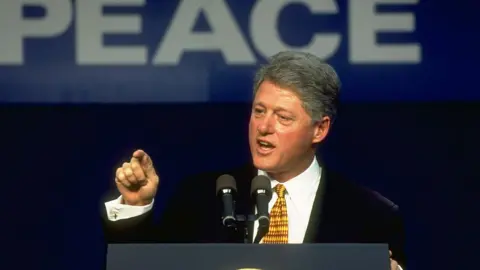 Getty Images
Getty ImagesOn Tuesday night US President Joe Biden will fly into Northern Ireland for an official visit.
He will be the fourth sitting US president to visit, following Bill Clinton, George W Bush and Barack Obama.
Recent negotiations over post-Brexit trading agreements in Northern Ireland have been a matter of great interest in Washington.
But why would the United States have such a vested interest?
Peace, that's why.
During the height of the Troubles, US policy was somewhat on the fence when it came to Northern Ireland.
Presidents Jimmy Carter and Ronald Reagan approached the issue sympathetically but mostly indirectly.
Things changed in 1992 when Mr Clinton pledged his allegiance to not only the US but Northern Ireland too.
With the recent appointment of Joe Kennedy as special envoy to Northern Ireland and President Biden's visit to the island to mark the 25th anniversary of the Good Friday peace agreement, there remains a keen interest from America.
Here's a look back at that special relationship.
August 1977
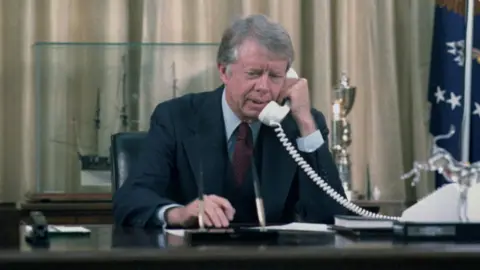 HUM Images
HUM ImagesPresident Carter issues a statement supporting the establishment of a form of government in Northern Ireland but says his administration has "no intention of telling the parties how this might be achieved".
"The only permanent solution will come from the people who live there. There are no solutions that outsiders can impose," he says.
1979
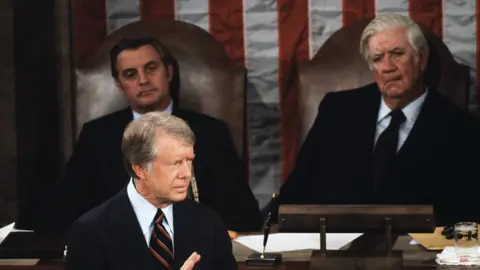 Wally McNamee
Wally McNameeSpeaker of the House of Representatives, Thomas "Tip" O'Neill, publicly supports a ban on American arms sales to Northern Ireland's police service the Royal Ulster Constabulary (RUC).
The UK had initially ordered 3,000 Magnum handguns and 500 semi-automatic rifles.
As a member of a group of pro-Irish unity American politicians, known as "the four horsemen", O'Neill hopes the ban will prompt Prime Minister Margaret Thatcher to resolve the conflict.
Despite a personal appeal from the prime minister when they meet in December, Mr Carter is unable to tackle Congress on the issue, with government papers later revealing he had pleaded with Mr O'Neill at Mrs Thatcher's request.
1980
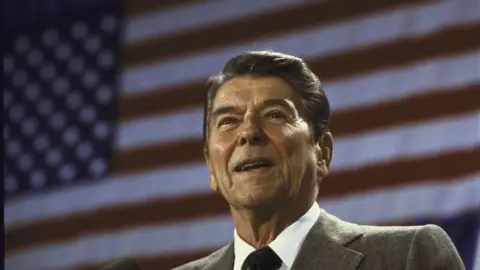 Dirck Halstead
Dirck HalsteadIn May Mr O'Neill meets UK Foreign Secretary Lord Carrington and claims that his ban has been misinterpreted.
He suggests any arms deals with the RUC will benefit the IRA as its supporters will stir up publicity for fundraising, in turn deepening the conflict.
President-elect Ronald Reagan expresses his own thoughts on the arms ban, saying: "The US cannot interfere or intervene but if there is any way we can be helpful we would be more than eager because I think it is a very tragic situation."
1981
In June Mr Reagan says the situation in Northern Ireland "really bothers" him and he would give "serious thought" to intervening.
The following month Taoiseach (Irish Prime Minister) Garret Fitzgerald writes to Mr Reagan to ask for help preventing the death of Irish republican hunger striker Kieran Doherty.
Mr Reagan ultimately refuses to intervene but expresses his sorrow, adding his own personal feelings "are well known to the British government".
1983
The US Congress passes a resolution in support of the New Ireland Forum and a united Ireland.
1985
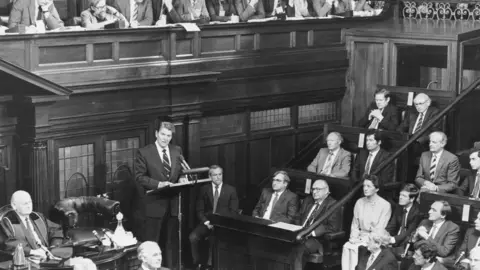 Getty Images
Getty ImagesThe UK and Irish governments seek the assistance of America in endorsing the Anglo-Irish Agreement. It gives the Republic of Ireland a consultative role in Northern Ireland for the first time.
Mr Reagan obliges and publicly praises the initiative.
March 1986
The House of Representatives unanimously votes to grant Northern Ireland a five-year $250m aid package.
1987-1994
Diversity Immigrant Visas are launched by the US, benefitting more than 52,000 Irish immigrants and strengthening ties between Dublin and Washington.
1992-1993
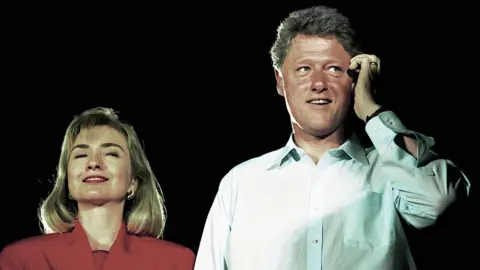 Getty Images
Getty ImagesPresidential hopeful Bill Clinton pledges a number of commitments on Ireland during his election campaign, indicating he would support the appointment of a special envoy to Northern Ireland.
In September 1993 the IRA observes a seven-day ceasefire to allow a group of prominent Irish-Americans to complete a fact-finding mission in Ireland, signalling a willingness to engage in the peace process.
1994
In January President Bill Clinton controversially grants a visa for Sinn Féin president Gerry Adams to visit America.
The decision is made against the advice of the UK government.
Later in the year the IRA's leadership council indicates it will call a ceasefire but only if republican Joe Cahill is granted a visa to enter the US and address the group's supporters there.
Due to his serious criminal record it takes the intervention of President Clinton to authorise the document.
1995
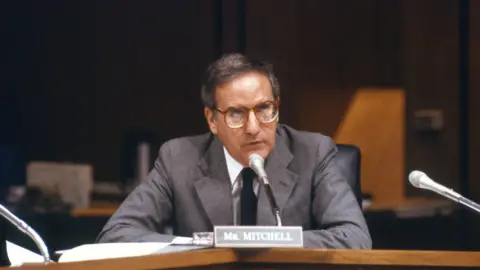 Getty Images
Getty ImagesPresident Clinton appoints former senator George Mitchell as the inaugural US special envoy to Northern Ireland.
He would later prove hugely influential in securing the Good Friday peace agreement.
In March Mr Adams applies for another US visa, this time to engage in fundraising activities.
The UK government's Northern Ireland Secretary Sir Patrick Mayhew and Foreign Secretary Douglas Hurd travel to the US, presenting their opposition.
The visa is granted, a decision that is said to infuriate Prime Minister John Major.
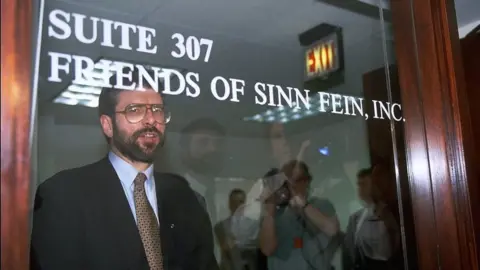 Getty Images
Getty ImagesDuring his visit Mr Adams visits a newly-opened Sinn Féin office in Washington DC.
He is also received at the White House on St Patrick's Day after agreeing to place decommissioning of weapons on the agenda for any further talks with the UK.
In November Mr Clinton travels to Belfast and Londonderry, becoming the first US president to visit Northern Ireland.
He is greeted by Protestants and Catholics in what is seen as a symbolic moment of the peace process.
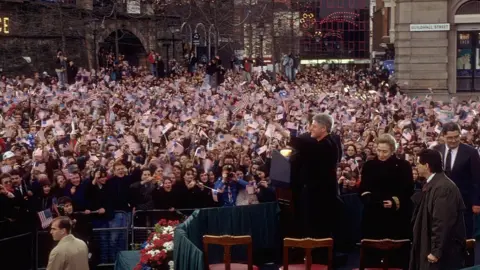 Getty Images
Getty Images1996-1997
While initially intended as an economic envoy for Northern Ireland, George Mitchell takes a hands-on approach at the request of the British and Irish governments.
In a January 1996 report about weapons decommissioning the "Mitchell principles" are outlined - six fundamental rules on which negotiations should be based.
They include a commitment to democratic and peaceful means of resolving political issues and the total disarmament of all paramilitary organisations.
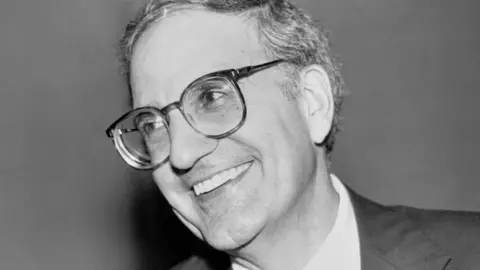 Getty Images
Getty ImagesApril 1998
The Good Friday Agreement is signed, the talks process having been chaired by Mr Mitchell.
His skill in brokering the agreement, much of it done in secret, earns him a reputation as a shrewd negotiator and someone who can be trusted by both sides.
The agreement sets up a new devolved government for Northern Ireland, in which unionists and nationalists will share power and outlines international agreements between the UK and Irish governments.
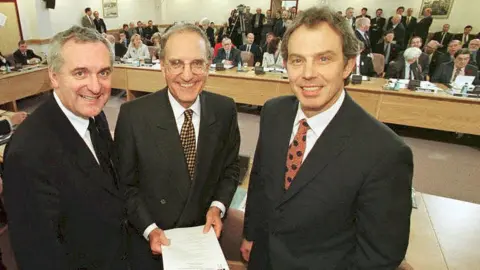 Getty Images
Getty ImagesSeptember 1998
President Clinton addresses the people of Omagh, County Tyrone, two weeks after a car bomb planted by dissident republicans opposed to the peace process kills 29 people.
"We will work to build this peace, to make it a place where children can dream, to redeem the loss of innocents from the madness of people who must fail so that your life can go on," he says.
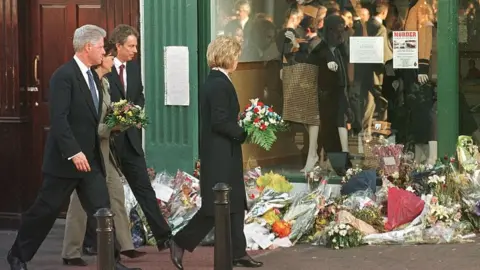 JOYCE NALTCHAYAN / Getty Images
JOYCE NALTCHAYAN / Getty ImagesSeptember 1999
Mr Mitchell returns to Northern Ireland, leading new negotiations on IRA disarmament and the establishment of a functioning assembly at Stormont.
The trip is a successful one, with parties returning to government by November.
December 2000
President Clinton makes a swansong visit to Ireland as he prepares to hand over the presidency to George W Bush.
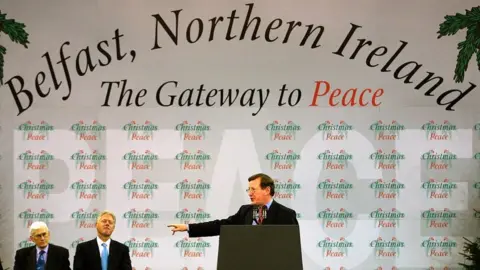 Getty Images
Getty ImagesHis trip concludes with a keynote address at the Odyssey Arena in Belfast, where he tells the crowd how "profoundly important peace in Northern Ireland is to the rest of the world".
"I think you know that I have loved this land and love the work I have tried to do for peace," he adds.
2001
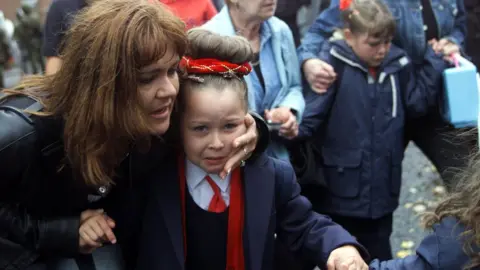 Getty Images
Getty ImagesNewly-elected President George W Bush calls on the IRA to disarm.
As tensions worsen during the Holy Cross dispute in Belfast where hundreds of loyalist protesters tried to block the route taken by pupils and their parents, who were from a Catholic background, on their walk to school, Mr Bush dispatches a new special envoy Dr Richard Haass to help diffuse the situation.
The newly-formed Police Service of Northern Ireland is invited to train alongside the FBI.
2002
The US names five paramilitary groups in Northern Ireland as illegal organisations: the Continuity IRA, the Loyalist Volunteer Force, the Orange Volunteers, the Red Hand Defenders and the Ulster Defence Association.
2003
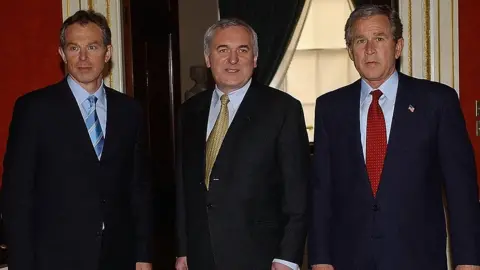 Getty Images
Getty ImagesIn April President Bush makes his first visit to Northern Ireland, calling for a "complete and irrevocable" end to paramilitary activity.
He meets Mr Blair and his Irish counterpart Mr Ahern at Hillsborough Castle in County Down.
Mitchell Reiss is appointed special envoy to Northern Ireland, serving until 2007.
2007
Paula Dobriansky is appointed special envoy to Northern Ireland. She holds the post until 2009.
2009
Irish-born Declan Kelly is appointed as economic envoy to Northern Ireland by US Secretary of State Hillary Clinton.
Mr Kelly says that his role will be "confined to economic matters only and he would have no political function".
2013
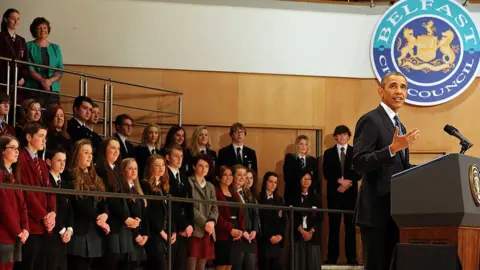 Getty Images
Getty ImagesPresident Barack Obama makes his first official visit to Northern Ireland.
He addresses a gathering at the Waterfront Hall in Belfast ahead of the G8 summit in County Fermanagh.
He says Northern Ireland is "part of an island with which tens of millions of Americans share an eternal relationship".
"If there's one thing on which Democrats and Republicans in America wholeheartedly agree it's that we strongly support a peaceful and prosperous Northern Ireland."
Later that year, with Stormont in deadlock, Dr Haass returns to Northern Ireland and says he will leave "no stone unturned" in an effort to reach an agreement with the five main parties before Christmas.
Months of talks break down without resolution but Dr Haass says "significant progress" has been made.
2014
With the position laying vacant for three years, Gary Hart becomes the second former senator to take on the role of US envoy to Northern Ireland, serving until 2017.
2016
In June the UK votes to leave the European Union, sparking the beginning of years of negotiations about how Northern Ireland's land border with the Republic of Ireland, and therefore the EU, will operate.
Meanwhile presidential hopeful Donald Trump hails the Brexit vote as "a great victory", telling the BBC that the result was "a fantastic thing".
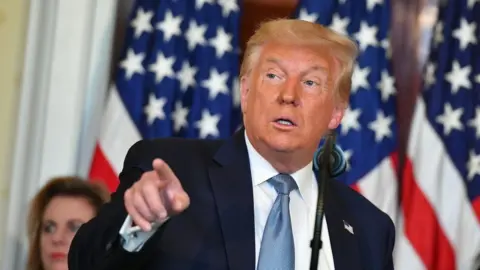 Getty Images
Getty ImagesIn November Donald Trump is elected as the 45th president of the United States,and gets a mixed response from Stormont politicians.
2017
Upon hearing of Mr Trump's intention to abolish the special envoy role, Gary Hart says it would be "a sad, even tragic decision".
He tells the Irish Times the move "fits into a Trump pattern" and was "part of a much larger picture of disengagement internationally".
2019
In June Mr Trump makes his first visit to the Republic of Ireland as US president and says the issue of the Irish border post-Brexit will "not be a problem at all".
During a press conference with Taoiseach Leo Varadkar, he says Americans "love the Irish" and that he believes things will work out well "with your wall, your border".
2020
In March 2020 President Trump appoints Mick Mulvaney as the special envoy for Northern Ireland.
He visits once before his resignation in January 2021 following the storming of the Capitol building.
2021
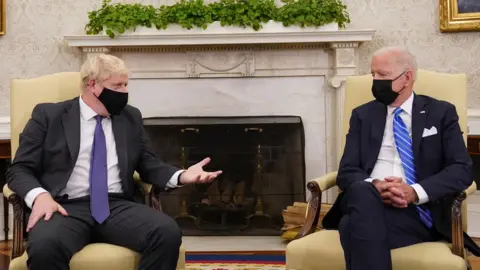 PA Media
PA MediaDuring talks with Prime Minster Boris Johnson in September, new US President Joe Biden warns that peace in Northern Ireland must not be jeopardised as a result of complications caused by Brexit.
He says he has concerns about the Irish border as concerns continue over the Northern Ireland Protocol, a trading arrangement negotiated during Brexit talks to prevent a hard border with Ireland.
2022
In September the White House warns that dismantling the Northern Ireland Protocol will "not create a conducive environment" for US-UK trade talks.
Mr Biden repeatedly urges the UK not to take any action that could potentially create a hard Irish border.
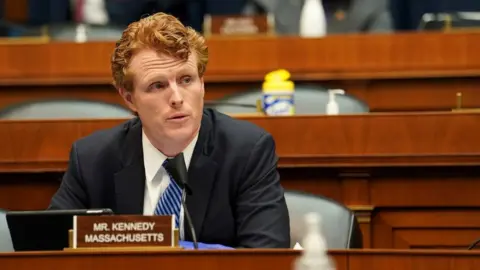 Getty Images
Getty ImagesIn December Joe Kennedy III is confirmed as the new US special envoy to Northern Ireland, something he describes as "an incredible honour".
The US State Department says he will concentrate on "advancing economic development and investment opportunities in Northern Ireland".
